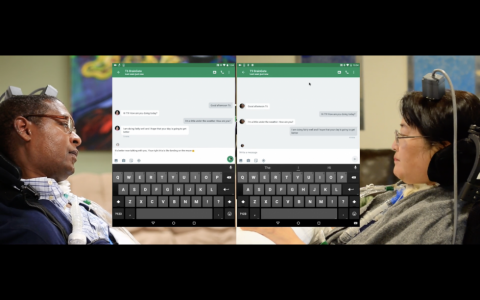Brain-computer interface enables people with paralysis to control tablet devices

Tablets and other mobile computing devices are part of everyday life, but using them can be difficult for people with paralysis. New research from the BrainGate consortium shows that a brain-computer interface (BCI) can enable people with paralysis to directly operate an off-the-shelf tablet device just by thinking about making cursor movements and clicks.
In a study published November 21 in PLOS ONE, three clinical trial participants with tetraplegia, each of whom was using the investigational BrainGate BCI that records neural activity directly from a small sensor placed in the motor cortex, were able to navigate through commonly used tablet programs, including email, chat, music-streaming and video-sharing apps. The participants messaged with family, friends, members of the research team and their fellow participants. They surfed the web, checked the weather and shopped online. One participant, a musician, played a snippet of Beethoven’s “Ode to Joy” on a digital piano interface.
“For years, the BrainGate collaboration has been working to develop the neuroscience and neuroengineering know-how to enable people who have lost motor abilities to control external devices just by thinking about the movement of their own arm or hand,” said Dr. Jaimie Henderson, a senior author of the paper and a Stanford University neurosurgeon. “In this study, we’ve harnessed that know-how to restore people’s ability to control the exact same everyday technologies they were using before the onset of their illnesses. It was wonderful to see the participants express themselves or just find a song they want to hear.”



